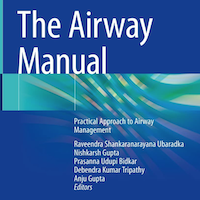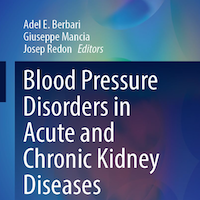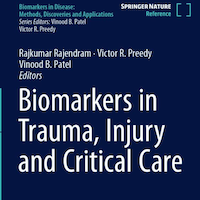Tag: infection
COVID-19 in the Air: The Hidden Viral Footprint in Hospital Waiting Rooms
New research from the Kirby Institute reveals that COVID-19 genetic material is frequently present in hospital air during community outbreaks, even in facilities with high-quality ventilation. By sampling air and surfaces... read more
Severe Trauma and Sepsis: Organ Damage and Tissue Repair
This book discusses recent progress in organ damage and tissue repair following severe trauma and sepsis. In part 1, it introduces the theory and clinical practice in organ damage. In part 2, it covers all the subjects... read more

Sepsis Management: PIRO and MODS
This book is unique in approaching multiple organ dysfunction syndrome (MODS) from the perspective of its pathophysiological mechanism, and addressing aspects that are overlooked in most of the available literature. Eminent... read more

Urinary Source Saves Lives: Why Infection Origin Matters in Septic Shock for Patients Over 90
In critically ill nonagenarians and centenarians admitted to ICUs with septic shock, the source of infection emerges as a key independent predictor of long-term survival, varying over time. Patients with septic shock from... read more
Protocol Power: Code Sepsis Boosts Bundle Compliance and Cuts Hospital Stays
Study Design: This was a retrospective, single-center study comparing patients with severe sepsis or septic shock before (Pre-Code Sepsis, PC) and after (After-Code Sepsis, AC) the implementation of a structured, team-based... read more
Reducing Mortality in Critically Ill Patients
This book describes the techniques, strategies, and drugs that have been demonstrated by multicenter randomized trials to influence survival in critically ill patients, defined as those who have acute failure of at least... read more

Breadth of Antibiotics Trumps Dose and Duration in Driving ICU Superbugs
In a large prospective cohort study across four ICUs (422 patients enrolled from March 2024 to January 2025), 35.8% of patients acquired carbapenem-resistant Gram-negative bacteria (CR-GNB) during their stay. Using sophisticated... read more
Superbugs Are Winning – Time to Fight Back with the Four-Pillar Plan
The relentless global surge in multidrug-resistant (MDR) infections, vividly illustrated by high rates of carbapenem-resistant Acinetobacter in Western Romania and echoed worldwide, is outpacing outdated diagnostic and treatment... read more
Why the 7-Day IV Change Policy Could Cost Lives and Millions
A new economic evaluation of the landmark RSVP trial reveals that adopting 7-day routine IV replacement (deemed “non-inferior” to every-3-day changes based on acute catheter infection rates) may actually be harmful and... read more
Steroids Save Lives in Severe Pneumonia and ARDS – Without Spiking Superbug Risk
A rigorous new systematic review and meta-analysis of 20 high-quality trials (3,459 patients) confirms that low-dose, short-course systemic corticosteroids significantly reduce short-term mortality in both severe pneumonia... read more
ICU Protocols: A Step-wise Approach, Vol I
The second edition of this highly successful book includes up-to-date notes on the step-wise management of clinical emergencies encountered in everyday intensive care units (ICU). Each thoroughly revised chapter provides... read more

ICU Quick Drug Guide 2nd Edition
This book provides precise, must-have drug information for the ICU. It offers essential, evidence-based practice guidelines for the critical care setting. Now in its fully revised and expanded second edition, ICU Quick Drug... read more

Lungs Hit Hardest: Respiratory Sepsis Survivors Face Sharply Higher Death Rates and Cognitive Decline Years Later
In a large cohort study of 12,854 ICU survivors in Germany, patients who survived respiratory sepsis (RS) – mostly from bacterial pneumonia – had significantly worse long-term outcomes than those who survived SARS-CoV-2... read more
Assessing Vulnerability: Frailty’s Link to ICU Infections
This study outlines the protocol and statistical analysis plan for a preplanned secondary analysis of the PROSPECT trial (Probiotics to Prevent Severe Pneumonia and Endotracheal Colonization Trial). The goal of this research... read more
Neuro-ICU Admissions: Lower Mortality, Higher Disability Risk
This large-scale retrospective cohort study analyzed the clinical and epidemiological profiles of over 62,000 Intensive Care Unit (ICU) patients across seven hospitals, finding that the 10,884 patients admitted for primary... read more
Cytokine Storm Syndrome
Cytokine Storm Syndromes, including HLH and MAS, are frequently fatal disorders, particularly if not recognized early and treated during presentation. The genetics of Cytokine Storm Syndromes are being defined with many of... read more

ICU Alert: Unraveling Mortality in Obstructive Pyelonephritis
This retrospective multicenter study investigated in-hospital mortality among 483 patients admitted to the ICU (8 centers) over a decade due to obstructive pyelonephritis, a severe condition often caused by kidney stones,... read more
Scarred Lungs: Identifying Fibrosis Risk After COVID-19 ARDS
This substudy of the large, multicenter RECOVIDS cohort investigated the predictive factors for developing fibrotic changes (FC) in survivors of COVID-19-related Acute Respiratory Distress Syndrome (ARDS) six months after... read more
Gut Feeling vs. Data: SDD Doesn’t Beat Standard Care for Ventilated Patients
This multi-center trial, spanning 26 Intensive Care Units (ICUs) in Australia and Canada and involving over 20,000 critically ill patients on mechanical ventilation, put a long-debated practice, Selective Decontamination... read more
Defending the Vulnerable: Neutropenic Sepsis Outcomes Improve Despite Higher Risk
A decade-long, single-center study in a French ICU examined the characteristics and outcomes of 185 consecutive patients admitted with neutropenic sepsis or septic shock between 2012 and 2022. The analysis revealed a... read more
Beyond Liver Failure: MELD-XI Predicts Sepsis Mortality
This retrospective cohort study investigated the utility of the MELD-XI (Model for End-Stage Liver Disease-Excluding INR) score as a predictor of 30-day mortality in over 16,600 adult ICU patients with sepsis, using data... read more
Clinical Examination Skills in the Adult Critically Ill Patient
This well-illustrated book provides detailed guidance on all aspects of physical examination in patients requiring emergency or intensive care. After an introductory section covering basic principles and the recognition of... read more








